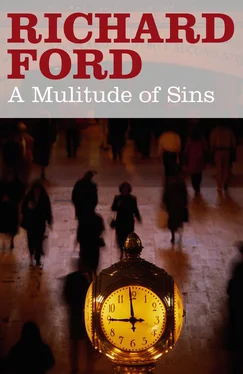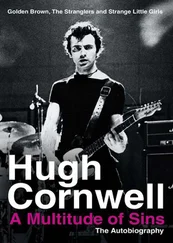“Maybe you’ve made a mistake here,” Henry said. “I said Madeleine’s not here.”
“ Is she sucking your dick,” the man said. “Imagine that. I’ll just wait.”
“I haven’t seen her,” Henry went on lying. “We had dinner last night. Then she went home.”
“Yep, yep, yep,” the man said and laughed sarcastically. “That was after she sucked your dick.”
Madeleine was still facing out the window, listening to one half of the conversation.
“Where are you?” Henry said, feeling disturbed.
“Why do you want to know that? You think I’m outside your door calling you on a cell phone?” He heard some metal-sounding clicks and scrapes on the line, and Jeff’s voice became distant and unintelligible. “Well, open the door and find out,” the man said, back in touch. “You might be right. Then I’ll kick your ass.”
“I’ll be happy to come talk to you,” Henry said, then stopped himself. Why say such a stupid thing? There was no need. He caught himself in the mirror just then, a large man in shirtsleeves and a tie, with a little bit of belly. It was embarrassing to be this man. He looked away.
“So, you want to come talk to me?” the man said, then laughed again. “You don’t have the nuts.”
“Sure I do,” Henry said miserably. “Tell me where you are. I’ve got the nerve.”
“Then I will kick your ass,” the man said in a haughty voice.
“Well, we’ll see.”
“Where’s Madeleine?” The man sounded deranged.
“I have no earthly idea.” It occurred to Henry that every single thing he was saying was a lie. That he had somehow brought into existence a situation in which there was not a shred of truth. How could that happen?
“Are you telling the truth?”
“Yes. I am,” he lied. “Now, where are you?”
“In my fucking car. I’m a block from your hotel, asshole.”
“I probably can’t find you there,” Henry said, looking at Madeleine staring at him. He had things back under control, or nearly. Just like that. He could tell in her expression — a pale face, with bleak admiration in it.
“I’ll be at your hotel in five minutes, Mr. big man,” Madeleine’s husband said.
“I’ll wait for you in the lobby,” Henry said. “I’m tall, and I’ll be wearing—”
“I know, I know,” the man said. “You’ll look like an asshole no matter what you’re wearing.”
“Okay,” Henry said.
The husband clicked off.
Madeleine had taken a seat on the arm of the blue-hydrangea chair, her hands clasped tightly. He felt a great deal older and also superior to her, largely, he understood, because she looked sad. He had taken care of things, as he always had.
“He thinks you’re not here,” Henry said. “So you’d better leave. I’m going to meet him downstairs. You have to find a back door out.” He started looking around for his suit coat.
Madeleine smiled at him almost wondrously.
“I appreciate your not telling him I’m here.”
“You are here,” Henry said. He forgot his coat and began looking for his billfold and his change, his handkerchief, his pocketknife, the collection of essential objects he carried. He would check out later. All of this was idiotic now.
“You’re not a bad man, are you?” she said sweetly. “Sometimes I’ll be alone, or I’ll be waiting for you, and I’ll just get mad and decide you’re a shit. But you really aren’t. You’re kind of brave. You sort of have principles.”
These words — principles, brave, shit, waiting — for some reason made him feel unexpectedly, heart-poundingly nervous, precisely when he didn’t want to feel nervous. He was not supposed to be nervous. He felt very large and cumbersome and almost frantic in the room with her. Not superior. He could just as easily start shouting at her. The fact that she was calm and pretty was intolerable.
“I think it’s time for you to leave,” he said, thinking again and suddenly about his suit coat, trying to calm himself.
“Yeah, sure,” Madeleine said, and reached to the side of the blue chair for her purse. She felt inside for keys without looking and produced a yellow plastic-springy car key loop, which seemed to make her stand up. “When will I see you?” she said and touched the bushed-up back of her hair. So changeable, he thought. “This is a little abrupt. I’d pictured something a little more poignant.”
“It’ll all be fine,” Henry said and manufactured a smile that calmed him.
“Setting aside the matter of when I’ll see you again.”
“Setting it aside,” he said, keeping the smile.
She flipped the yellow, springy key loop back and forth once across her fingers and started for the door, going past where Rothman was waiting for her to leave. No kiss. No hug. “Jeff’s not violent,” she said. “Maybe you two’ll like each other. You have me in common, after all.” She smiled as she opened the door.
“That may not be enough for a friendship.”
“I’m sorry this is ending this way,” Madeleine said quietly.
“Me, too,” Henry Rothman said.
She smiled at him strangely and let herself out, permitting the door to shut with a soft click. He thought she hadn’t heard him.
Waiting in the elevator vestibule, where a cigar aroma hung in the air, he began now to contemplate that he was on his way to meet the irate husband of a woman he didn’t love but had nevertheless been screwing. It was like a movie. How was he supposed to think about all this? This would be a man he didn’t know but who had every right to hate him and possibly want to kill him. This would be a man whose life he had entered uninvited, played fast and loose with, possibly spoiled, then ignored, but now wanted out of, thank you. Anyone could agree that whatever bad befell him was exactly what he deserved, and that possibly nothing was quite bad enough. In America, people sought damages in this sort of disagreement, but probably not in Canada. He thought about what his father would say. His father was a large man, gone bald, with a great stiffened stomach and an acerbic manner from years of treating Virginia-cracker anti-Semites with lung cancer. “At the bottom of the mine is where they keep the least amount of light,” his father liked to say. Which was how he felt — in the dark without a reasonable idea for how to go about this. But not frantic now. More like engaged. He’d never been able to stay frantic.
But just blundering in as though he understood everything and letting events take place willy-nilly would certainly be the wrong course. He didn’t need to know much about Jeff — it had never been necessary. But knowing nothing was unlawyerly. On the other hand, there was something so profoundly un serious about this whole debacle, that a sudden urge he recognized as similar to derangement made him want to break out laughing just as the mirrored elevator slid open. Still, as long as Madeleine was out of the hotel, and as long as Jeff hadn’t kicked in the door and caught them in the middle of something private — which hadn’t happened — then who cared who knew who? The lawyer Henry Rothman said this was all about something a man he didn’t know might dream up, versus what he himself would never admit to. Nothing added to nothing. He would simply tell as many lies as necessary — which was lawyerly: a show of spurious good will being better than no show of any will. Actual good will would be represented by the trouble of inventing a lie to cancel out the bad will of having an affair with Madeleine in the first place. And since his relationship with Madeleine was now over with, Jeff could claim the satisfaction of believing he’d caused it to be over. Everybody gets to think he wins, though no one does. That was extremely lawyerly.
Читать дальше












